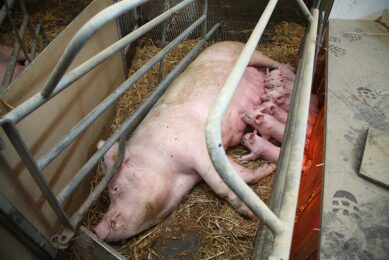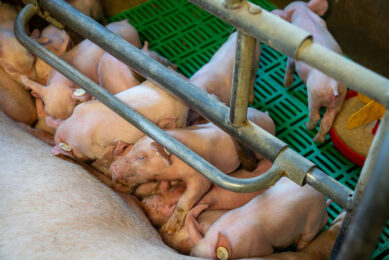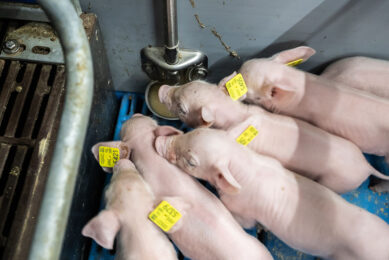“Fermented rapeseed meal at least as effective as ZnO”

Fermented rapeseed meal has been found to be at least as effective as zinc oxide to improve piglet growth, intestinal development and health.
That was the outcome of a recent study by researchers from the University of Copenhagen and Aarhus University, which got published in the open-access journalAnimals. The article was co-authored by writers from Danish company Fermentation Experts.
Phasing out of medicinal zinc oxide
The research was carried out in the context of the phasing out of the feeding of medicinal zinc oxide (ZnO) to weaner piglets in Europe after 2022. This means that pig producers are in need of new solutions to manage post-weaning disorders.

The phasing out of zinc oxide was the key theme of last year’s Zero Zinc Summit
The study assessed whether rapeseed meal could improve weaner piglet performance and stimulate intestinal development as well as maturation of gut microbiota in the absence of in-feed zinc. In total, 1,240 weaned piglets were used for the trial, aged from 28 to 85 days.
In total 5 different options were provided to the piglets. They all received a basal diet with either:
- No additives added (negative control);
- 2,500 ppm in-feed zinc oxide (positive control);
- Rapeseed meal, fermented alone;
- Rapeseed, co-fermented with a single brown macroalgae species (Ascophylum nodosum); or
- Rapeseed, co-fermented with 2 brown macroalgae species (A. nodosum and Saccharina latissimi).
Solid state fermentation
Fermentation occurred using solid state fermentation using an inoculum consisting of 3 lactic-acid fermentative bacteria, being Pediococcus acidilactici, Pediococcus pentosaceus and Lactobacillus plantarum.
Piglets fed the fermented rapeseed and the rapeseed co-fermented with 1 macroalgae had a similar or numerically improved, respectively, production performance compared to the piglets getting zinc oxide.
In addition, the researchers wrote that the options with zinc oxide, rapeseed meal, fermented alone and with both microalgae species stimulated jejunal villus development, more than in the case of negative control.
Thirdly, they wrote, the fermented rapeseed enhanced colon mucosal development and reduced signs of intestinal inflammation. Last but not least, all fermented feeds, as well as the diet including zinc oxide induced similar changes in the composition and diversity of colon microbiota, when compared to the diet that did not contain any additives.
Performance, gut development and health
In conclusion, the authors wrote, piglet performance, intestinal development and health indicators were sustained or numerically improved when in-feed zinc was replaced by fermented rapeseed meal alone.
As for the mode of action, they wrote: “This could be attributed to the improved development of small intestinal villi and hind gut mucosa, improved gut barrier function in jejunum and colon (mucosal and brush border integrity, the presence of gut-associated lymphoid tissue (GALT) structures and negligible intestinal inflammation indices), and changes in colon microbiota in the direction of larger microbial diversity (robustness).”
The research paper was authored by G.D. Satessa, Y. Hui, T. Cieplak, L. Krych and D.S. Nielsen, University of Copenhagen, Denmark; M.O. Nielsen, Aarhus University, Denmark; P. Tamez-Hidalgo, S. Kjærulff and G. Brunsgaard; Fermentation Experts, Denmark.
 Beheer
Beheer









 WP Admin
WP Admin  Bewerk bericht
Bewerk bericht